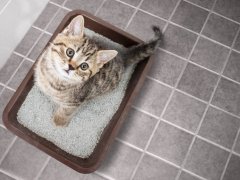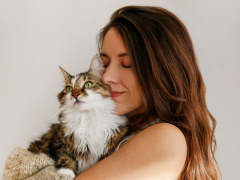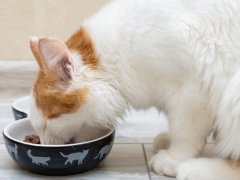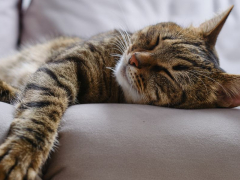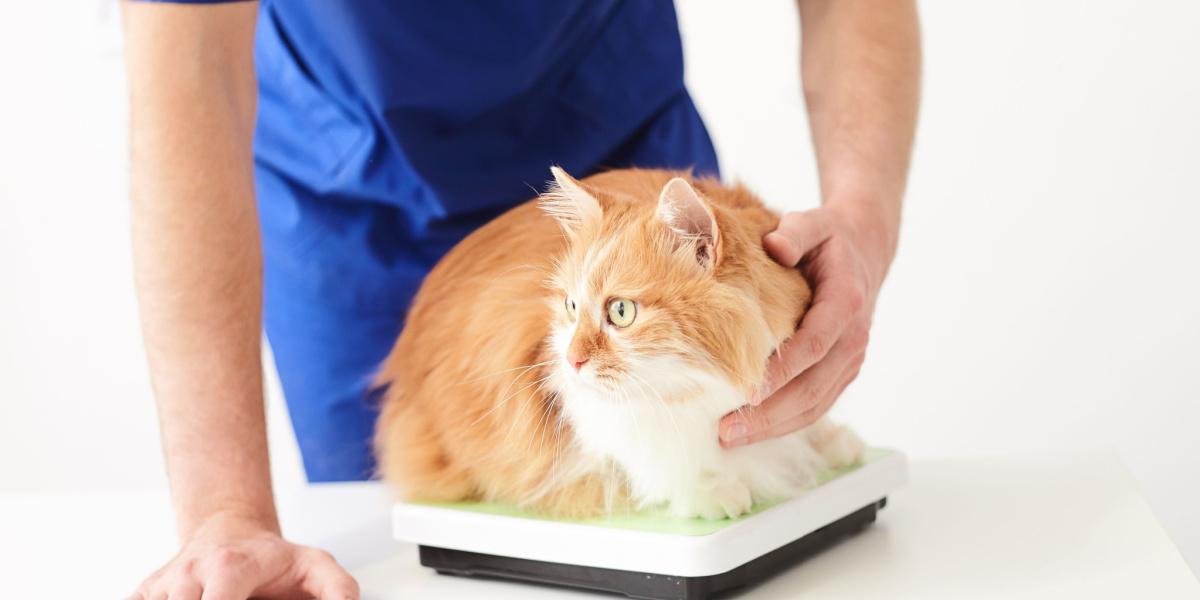
We all want our cats to be healthy and happy. This includes making sure our cats are a healthy weight for their size. It can be difficult to know how much to feed your cat and how to stop them from becoming overweight or too thin. This is especially true when their fluffy coats get in the way of revealing their true size. A cat that is suddenly losing weight may seem concerning.
If your cat is losing weight, it could be for many reasons. Weight loss in cats can be as simple as the wrong food, or intestinal worms. Occasionally though, it can also indicate more life-threatening causes, such as cancer or diabetes.
It’s important to know how to monitor your cat’s weight, and when veterinary intervention is needed. Let’s take a look at what to do when your cat is losing weight.
Signs Your Cat Is Losing Weight
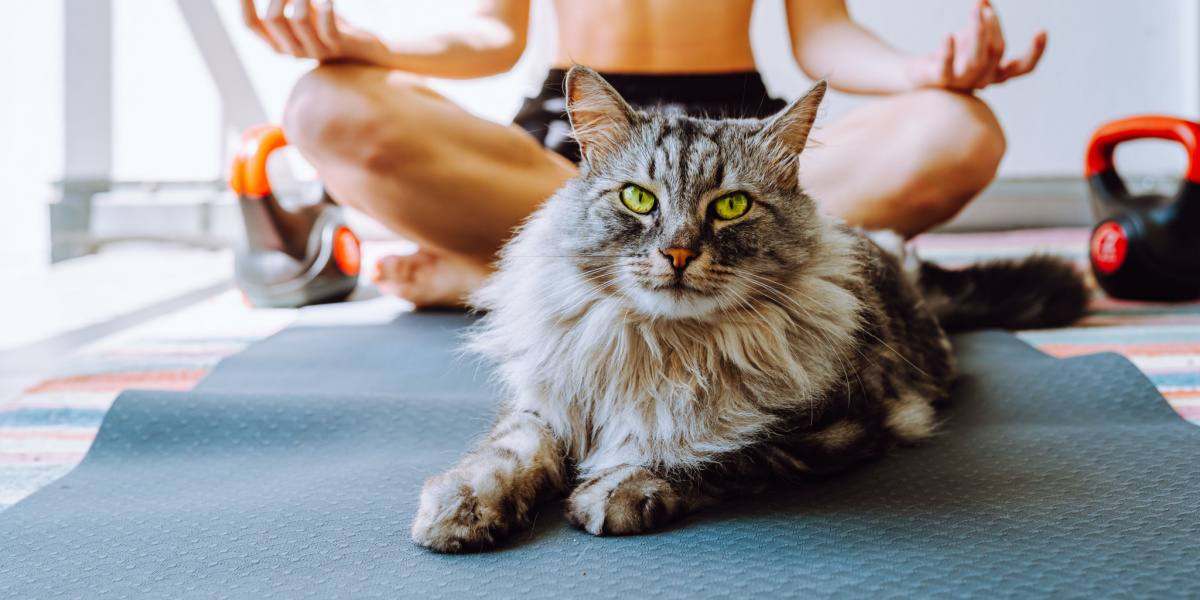
A fluffy cat’s fur can hide a cat’s true size, making it a challenge to recognize weight loss by sight alone.
A cat’s weight can be difficult to judge visually. With their fur mostly concealing their bodies, gradual weight loss can be especially tricky to spot. Being aware of your pet’s weight is a good habit to get into, so here are some easy methods to try.
Also Read: The 7 Best Cat Foods For Overweight Cats
Condition
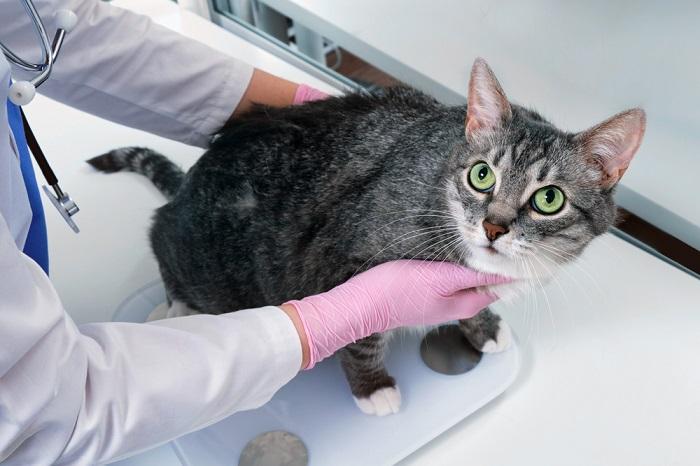
Knowing what is considered normal and healthy for a cat’s body size and shape is a good first step to assessing your own cat’s weight and health.
Pay attention to your cat’s body condition. You should be able to feel the ribs when you stroke their sides firmly, but also feel a covering of fat. Their tummy should tuck up towards the pelvis (a bit of saggy skin between the hindlimbs is normal) and if you look from above, the waist should be seen as a small indent. As cats become underweight, their ribs and spine become obvious, the waist becomes very distinct, and their tummy has a very tucked-up appearance.
Also Read: Cat Weight Calculator
Actual Weight
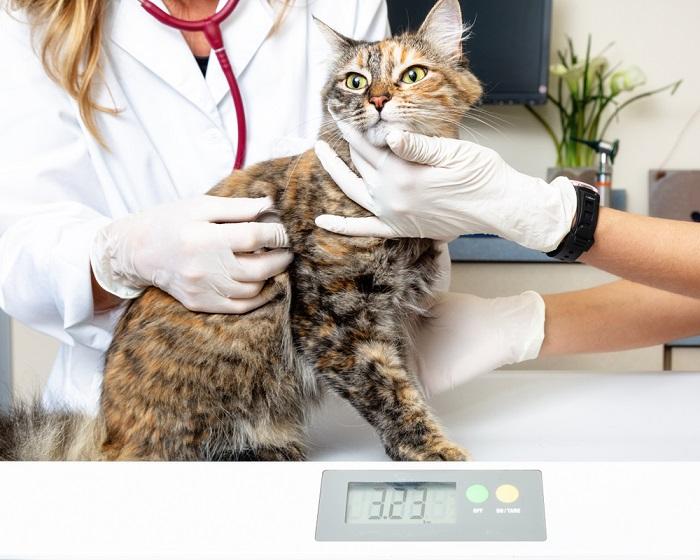
Weighing your cat once a month should be sufficient for keeping an eye on your cat’s weight unless there is a cause for concern. Then, weigh them weekly.
If you can weigh your cat regularly, this is a very accurate way of keeping track of any loss or gain. You will need fairly accurate scales, as cats are quite small, meaning that even tiny discrepancies have more impact. One easy way is to weigh yourself first, then weigh yourself whilst holding your cat.
You can then subtract your weight from the total, leaving your cat’s weight. It is not necessary to weigh your cat every day: every few months is fine if there are no concerns. If you think your cat is losing weight then try and weigh weekly for a few weeks so see if your suspicions are correct.
Also Read: Best Cat Food For Weight Gain
Other Signs
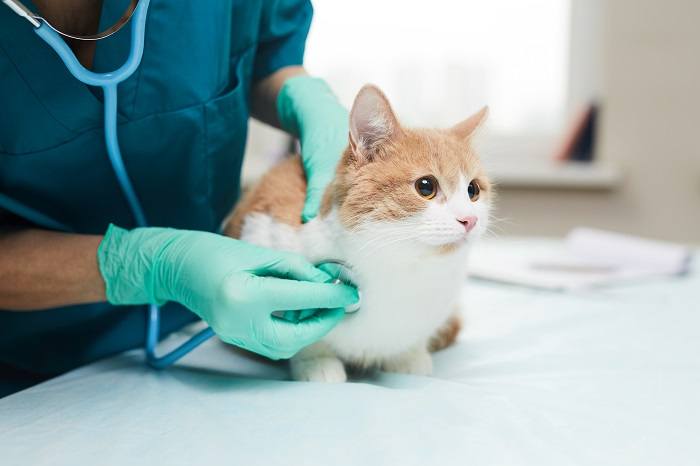
Check for other symptoms that your cat is feeling unwell. They often occur alongside unexpected weight loss.
If you are having trouble getting weighing your cat, you can always take them to a veterinarian for a check-up. You may also want to look for other signs which may accompany weight loss: change to appetite or thirst, vomiting or diarrhea, low energy, poor coat condition, drooling or bad breath.
Also Read: How To Get Mats Out Of A Cat’s Fur
Causes Of Weight Loss In Cats
There are many reasons why your cat may be losing weight. Some are more serious than others. Many of these health concerns require veterinary intervention, so if you notice any unintentional weight loss in your cat it is best to seek professional advice.
1. Dietary Intake
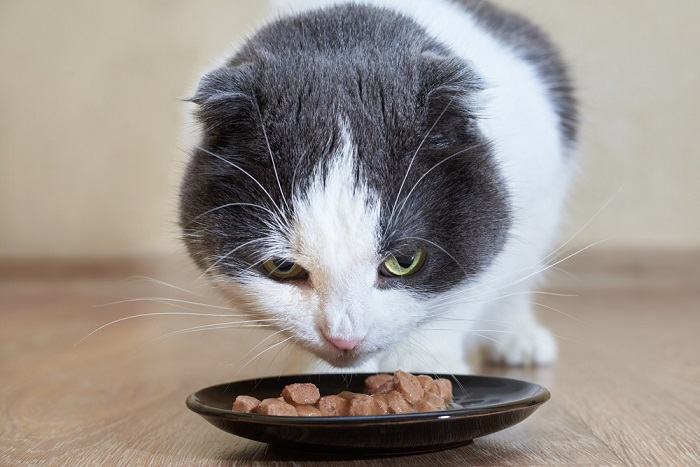
Making sure that your cat is getting the right food and the right amount of food is the first step in making sure your cat is a healthy weight.
The simplest reason your cat is losing weight is that they are not eating enough nutrients to maintain their condition. This may be due to another pet in the household stealing food, or restricting access to the food bowl.
It could also be due to a change in cat food brands. Different brands require different amounts to be fed. Also, irregular mealtimes or poor-quality ingredients can contribute to weight loss. Check that your cat is on a good-quality, complete, and balanced cat food suitable for their life stage, and that they have clear access to the food.
Also Read: Why Do Cats Try To Bury Their Food?
2. Stress
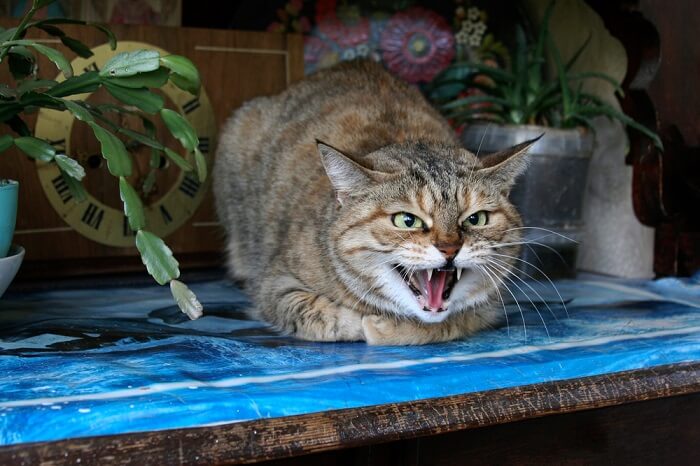
Stress in cats can affect their appetite and eating habits.
Cats can suffer from anxiety due to a variety of reasons: a new pet or baby in the house, conflict with another cat, loud noises, or building work, to name a few. Stress can manifest in multiple ways in cats – some may hide away, others may urinate outside the litterbox, and others may become destructive or aggressive.
Losing interest in food, or spending all their time hiding and therefore not eating is a fairly common presentation of anxiety in cats, and the consequence, if this behavior continues, is gradual weight loss.
Also Read: Stress In Cats: Causes, Symptoms, & Treatment
3. Intestinal Parasites
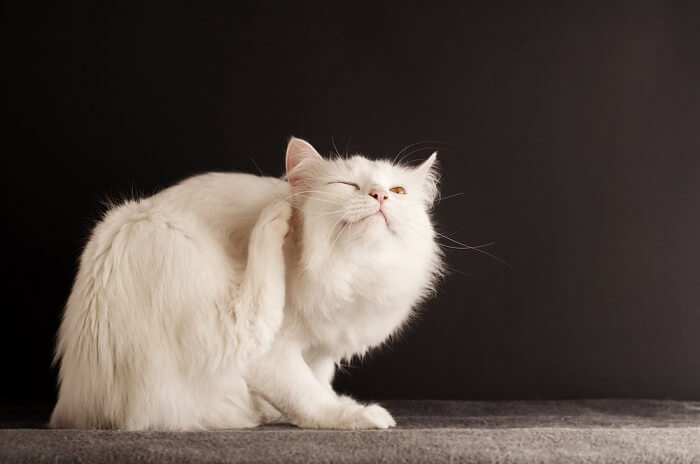
Worms and intestinal parasites can be a cause of weight loss in your cat.
Internal parasites such as roundworms and tapeworms can cause weight loss in cats, often alongside an increase in appetite, bloating and sometimes vomiting or diarrhea. Worms can be passed from a mother cat to her kittens, ingested via hunting prey, from fleas, or brought in from the environment.
They can affect both indoor and outdoor cats. Sometimes, live worms or eggs can be seen in cat poop, but often this only occurs with high levels of infection. Your veterinarian can look at your cat’s feces under a microscope for any evidence of worm eggs, and there is a multitude of options for treatment.
Also Read: The 11 Best Flea Treatments for Cats
4. Dental Problems
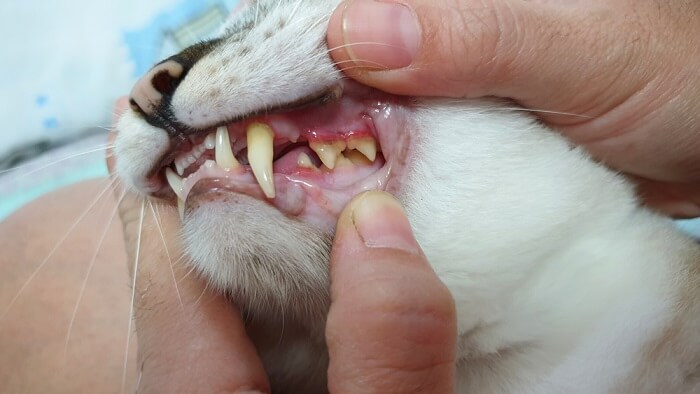
Keeping an eye on your cat’s dental health is an important aspect of pet care.
Cats have a strong survival instinct and often will continue to eat despite having problems with their teeth or gums. However, dental pain will naturally cause a drop in eating behavior, and can also lead to food dropping out of the mouth as the cat tries to eat, or not being properly chewed. Dental disease is common in cats, and many older cats will suffer from some degree of difficulty.
Also Read: The Complete Guide To Dental Cleaning For Cats
5. Hyperthyroidism
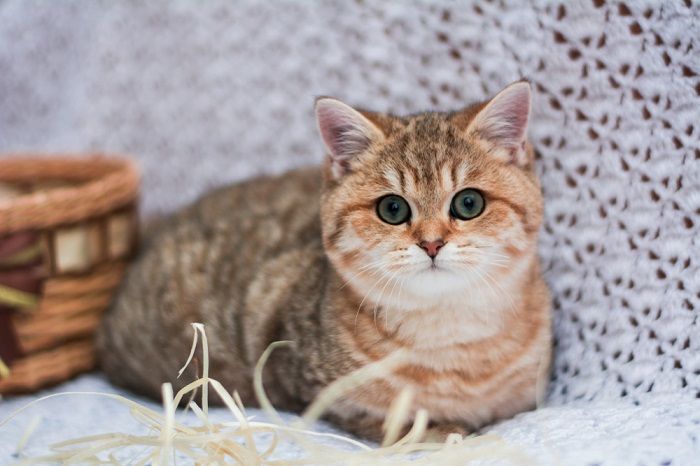
Mostly seen in older cats, an overactive thyroid gland increases a cat’s metabolic rate, leading to weight loss. The increase in thyroid hormone also causes an increased appetite and thirst, an increase in urination, poor coat condition, and a variable degree of hyperactivity. Cats can be diagnosed with a blood test.
Also Read: Cat Bloodwork (Different Types of Tests, Health Conditions And Costs)
6. Diabetes
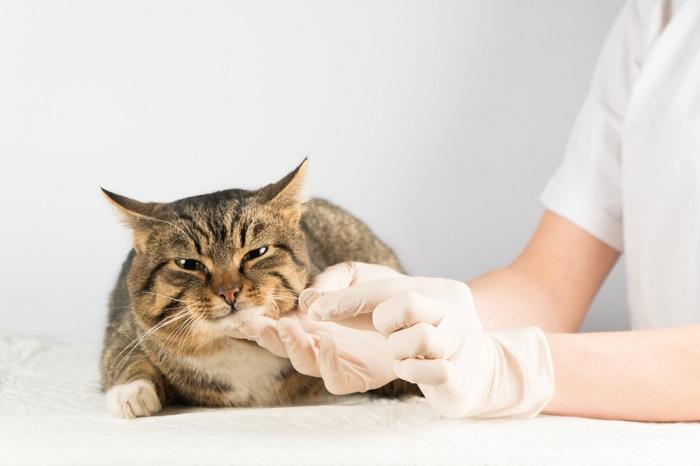
The most common symptoms of diabetes in cats are increased thirst and urination, however, weight loss is also a frequent sign. Their appetite is often poor, and they may become acutely unwell with vomiting and sudden lethargy if they go into a diabetic crisis. This condition is discovered by looking for glucose in blood work and urinalysis.
Also Read: Is My Cat Bored? 8 Signs to Watch Out For
7. Kidney Disease
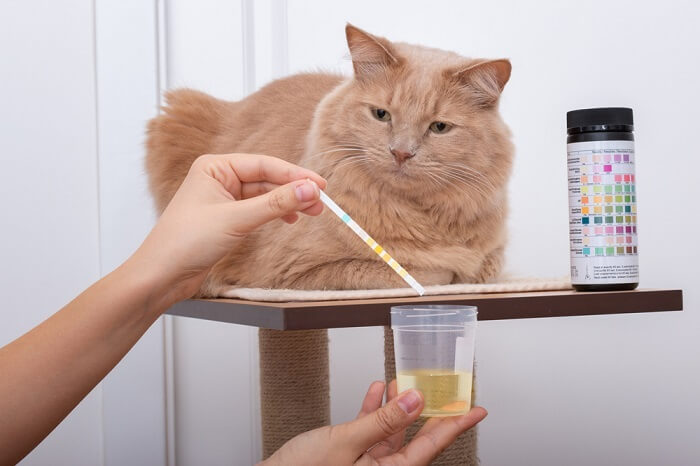
Sometimes a urinalysis for your cat is necessary to discover underlying health issues.
Another common complaint in more senior cats is poor kidney function. This often leads to a drop in appetite and gradual weight loss. Often, increased thirst and urination are seen alongside, and vomiting is also possible. Blood and urine tests are essential to understand how well your cat’s kidneys are working.
Also Read: Polycystic Kidney Disease In Cats: Causes, Symptoms, and Treatment
8. Viral Disease
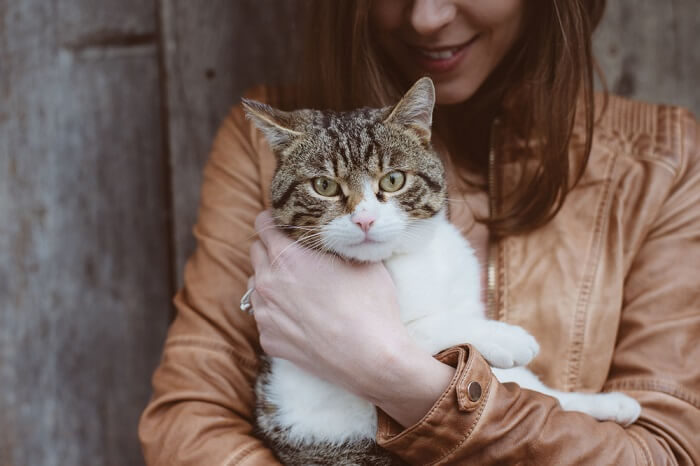
Some viral diseases, such as FeLV (feline leukemia virus) and FIV (feline immunodeficiency virus) cause a multitude of symptoms, of which weight loss can be one.
Also Read: Feline Leukemia Vaccine: Cost, Schedule & Side Effects
9. Intestinal Disease
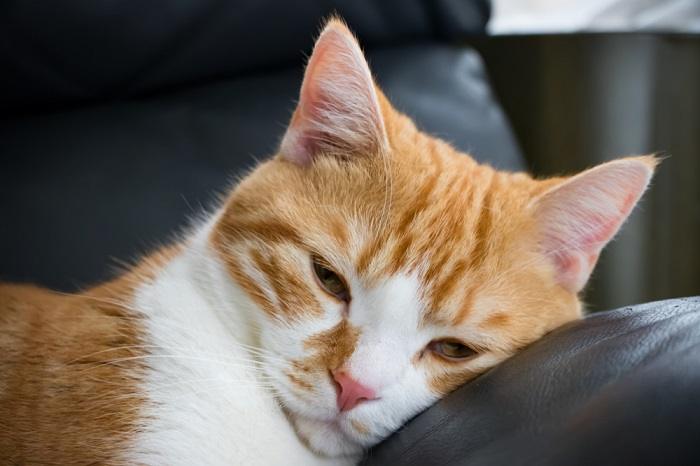
While cats are good at hiding pain to appear less vulnerable to predators, some conditions that cause weight loss can be painful for your cat.
Any medical condition involving the GI tract can potentially cause weight loss, alongside other gut symptoms. Symptoms can include vomiting, diarrhea, and belly pain. Intestinal cancers, heart disease, inflammatory bowel disease, food allergies, and pancreatitis can all lead to chronic weight loss.
Diagnosis of some of these conditions can be more challenging and may involve blood tests, ultrasound scans, x-rays, or biopsies.
Also Read: How Much Does A Cat X-Ray Cost?
10. Other Illness
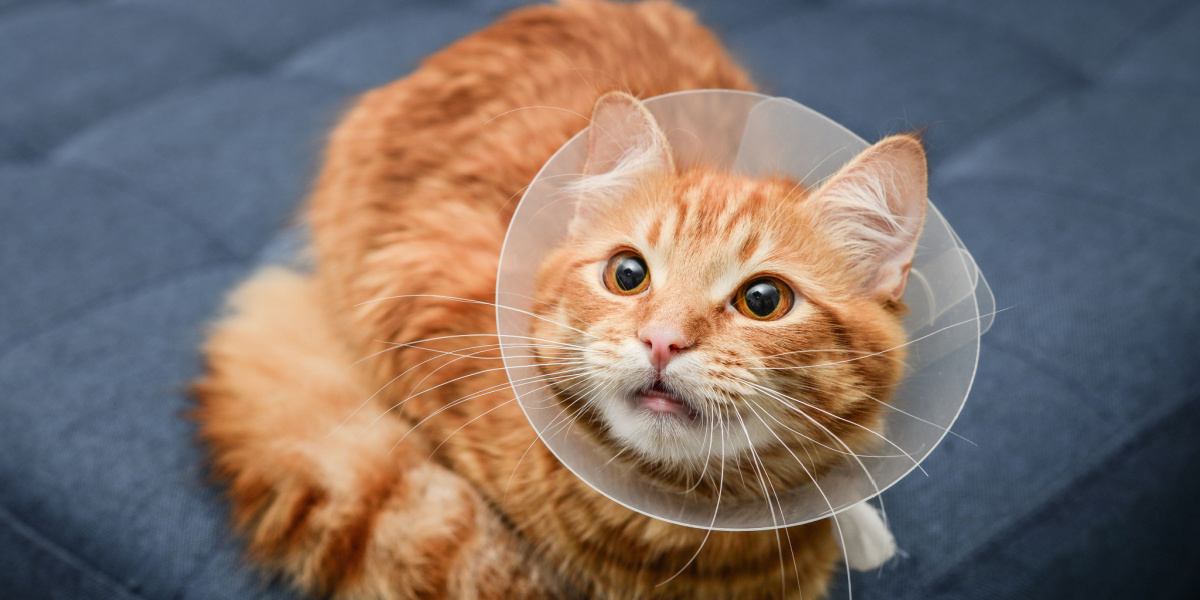
Sometimes weight loss in cats happens with certain chronic conditions.
Most diseases in cats have the potential to cause weight loss, including liver disease, cancer, and infections. Cats who are in chronic pain can also have reduced appetites, leading to a drop in weight and condition.
Also Read: Why Is My Cat Not Eating? Loss Of Appetite In Cats
When To Worry
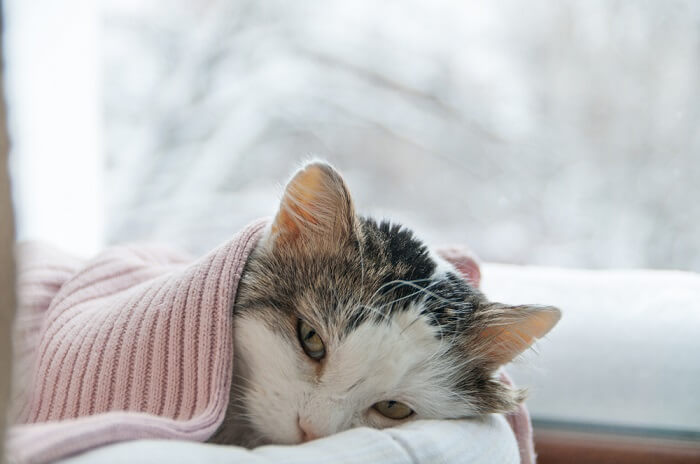
If your cat seems unwell, it is always a good idea to seek help from a veterinarian.
If you are actively trying to reduce your cat’s weight, due to obesity, then a gradual reduction is best. Rapid weight loss can cause liver disease (hepatic lipidosis) in cats, so always discuss your cat’s diet with a vet.
If you have noticed an unexpected weight loss, it is recommended to seek veterinary attention, whatever the amount or rate of loss. There are so many different causes for weight loss in cats, and most will need medical intervention. An essential first step in deciphering the cause, and setting up a treatment plan, is to book an initial appointment with a vet.
Also Read: Cat Obesity Chart: Find Out if Your Cat is Obese
Treatment Of Weight Loss In Cats
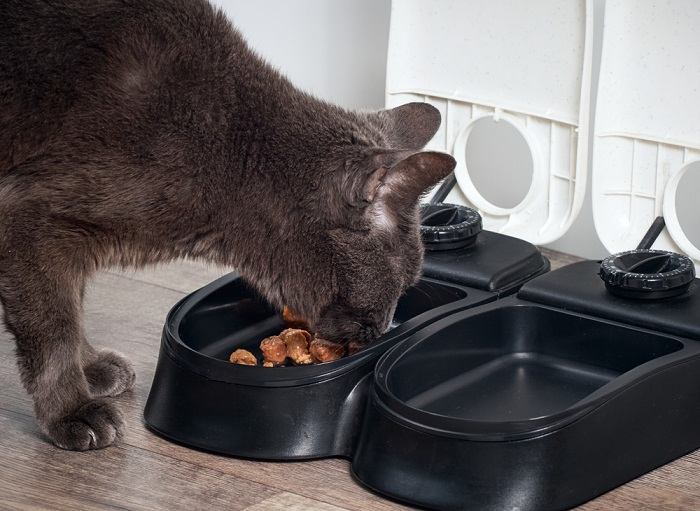
The management of weight disorders in cats depends highly on the cause. Intestinal worms are easily treated with spot-on, liquid, or tablet medication. Dietary causes can be re-balanced with a complete nutritional plan, and behavioral modifications can be put in place for stress-related concerns.
The first step is a veterinary appointment. The vet will perform a physical exam and take a thorough history, and may then recommend blood work and urinalysis. Depending on the symptoms and the initial results, your cat may need further tests such as scans or biopsies.
Medical causes will have varying treatments and prognoses. Hyperthyroidism can be managed with medication or diet, or cured by surgery or radioactive iodine treatment. Diabetics can be treated with insulin and dietary management, and tooth-related pain can be alleviated with dental treatment.
Some conditions are harder to treat than others, such as some cancers, renal disease, and viral diseases. However, there are often management strategies to alleviate symptoms and support appetite and weight.
Also Read: The 8 Best Cat Vitamins And Supplements
Also Read: Top 10 Things Your Vet Wishes You Knew
Frequently Asked Questions
Why is my cat losing weight but still eating?
There are various medical causes of weight loss in cats, such as hyperthyroidism, diabetes, dental disease and gastrointestinal disorders. Pain, stress and dietary problems can also lead to weight loss, even if the cat is still eating.
Why is my cat suddenly so skinny?
Rapid weight loss in cats is usually due to a medical cause, such as hyperthyroidism, diabetes or kidney disease. It is recommended to take your cat to the vet to be checked over if there is any loss of weight.
When should I be concerned about my cat losing weight?
Any unexpected weight loss in a cat is a concern. There are various medical causes of weight loss in cats, and veterinary advice should be sought if you have noticed any drop in weight or condition.
How much weight loss in a cat is concerning?
Cats are small animals so even a small amount of weight lost or gained is usually significant. Seek advice from a veterinarian if you notice your cat has lost weight.



